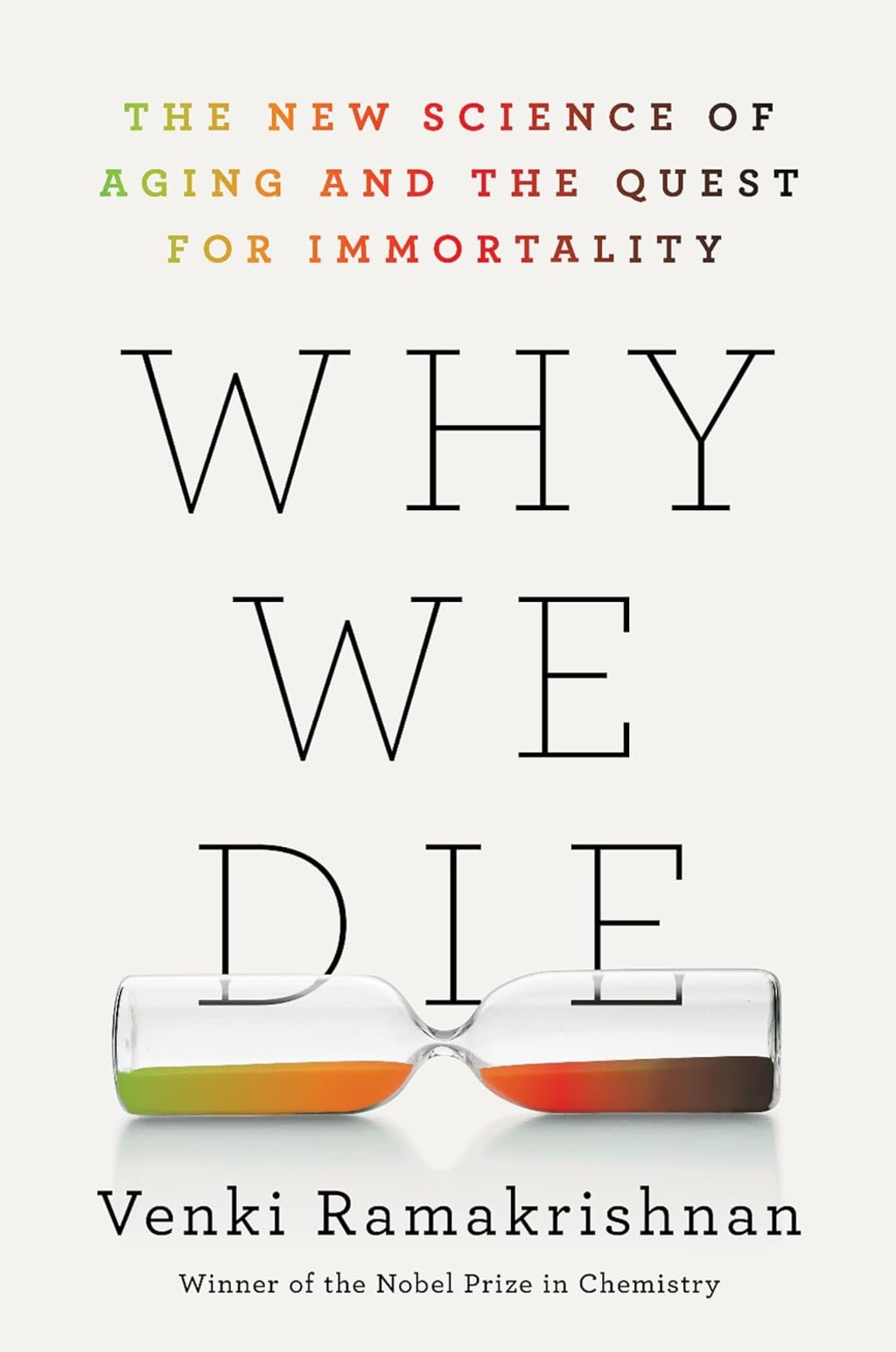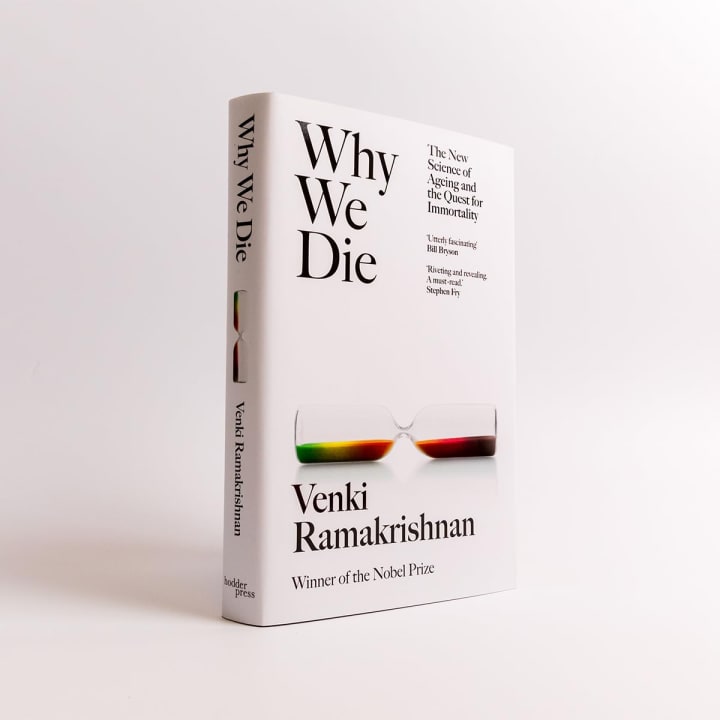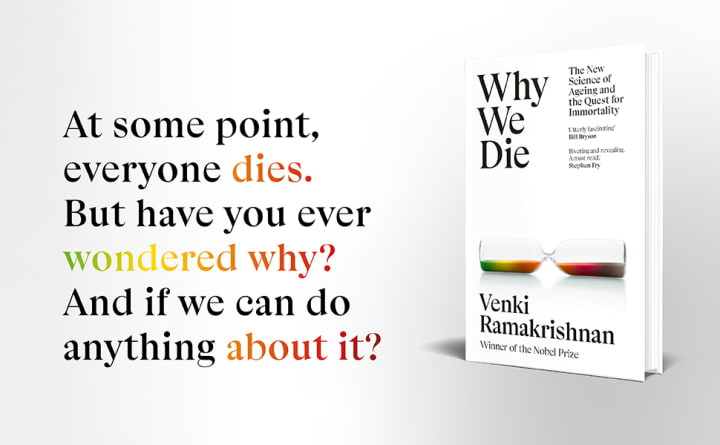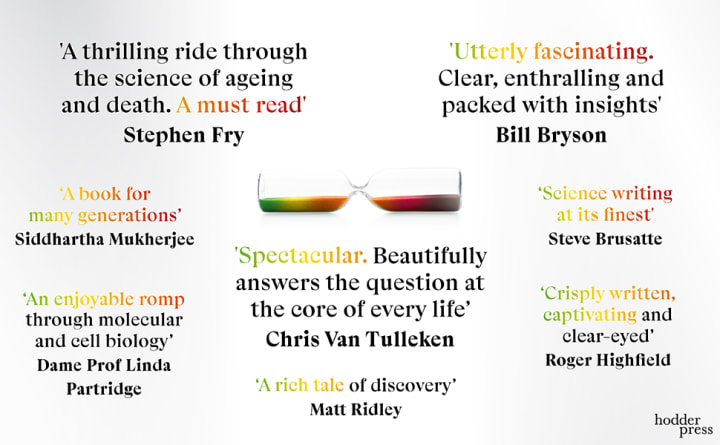Book Review: "Why We Die" by Venki Ramakrishnan
5/5 - a fascinating scientific read for absolutely anyone...

To be perfectly honest with you the reason I decided to read this book is because Stephen Fry said it was good. A lot of what Stephen Fry says is good is very rarely bad and so, I trust his judgement of what constitutes as a 'good' book. I had only momentarily heard of the author of this book as obviously, being a Nobel Prize Winner but if I were to tell you that I knew why he won it or even for which science, I would be lying - I had no idea. All I knew is that he did win it and that's where my knowledge ended.
When I picked up the book my initial thoughts were that this was going to be one perplexing solid read and to my surprise, it was not only that but it was also a deep and meaningful argument about new-age science. It starts off with the exploration of the tomb of Tutankhamen and how the Ancient Egyptians ritualised death. He discusses the animal kingdom's understanding of death and how humans have a need to avoid it philosophically as well as intrinsically. There is a discussion of four different ways in which we seek to avoid death and another on how many don't seem to rationalise it as it is something that happens to other people and not themselves. From an incredibly interesting introduction, I was ready to delve into the great world of death, how humans are seeking to conquer it and why they're bothering to.

Let's go through the advantages because to be fair, there are really no actual disadvantages of reading this book. The first is that I probably learnt more from reading this book than I learnt in 5 years of biology classes at school. I am aptly aware or Darwin's theories (which this book covers) but as for the other guys and their theories (for example: Waddington) I remember hearing their names, but before reading this book I couldn't tell you what they did with a gun to my head. This book really opens your eyes as to how many people have done how many things to contribute to finding out how and why we start ageing and how and why ageing causes us to die.
One of the things I found incredibly interesting in the first few chapters was learning about how sea creatures regenerate. For example: how you can cut off the arm of a starfish and it grows back. I genuinely did not know that before. Another thing from the first few chapters that was interesting is when the author looks at life expectancy in humans and how it has grown from people being expected to die in their 30s to what it is now of around 80-something. The growth seems amazing and yet the author still makes the point of the fact that curing various diseases may actually only increase life expectancy by a small amount and by the time life expectancy could be seen as over 100 years' old, everyone alive today would already be dead.

I think one of the best things I have learnt in this book is about how cells have some sort of 'suicide trigger' and destroy themselves if they are overtly and overly damaged. If I am going to be deadly honest with you I will have to tell you how bad I am at biology and how I actually had a dictionary application open whilst reading this. Get ready for all the terminology you have never heard of being thrown at you. But then again, when you really think about it there is no other way to explain it to the reader, so it is entirely necessary and forgiven. The cell thing was confusing to read but the whole 'suicide trigger' they have contributes to ageing which in turn, contributes to death. I don't want this to read like a science lesson, so I will urge you to read the book for yourselves.
Another thing I found quite interesting in this book is the research around why Alzheimer's Disease even happens and how it actually causes death. This author has made the claim that through tons of research it has been found that one third of everyone born after 2015 will have contracted some form of dementia in their later lives. But, the result of ageing and a cause for ageing, this disease is special in the fact that it makes the patient completely forget who they are and even forget how to do basic and almost instinctive things. I found it fascinating to learn about how the disease is formed and looking into different biological and societal factors, the author even explores a tribe where there are sufferers of a type of the disease.
There's a whole section on how new age science is trying to increase our life expectancies and all of this is interwoven into the narratives of historic discoveries that come along. This is one of the other things I thought was fantastic. Even though there were masses of science words in the book that I had to learn, there were also these great historical narratives of grand discoveries that take you back to the moment of discovery. It gives you a real feeling of being there at the time. These include the man who basically discovered the Alzheimer's Disease amongst others.

The book honestly cover so many interesting topics upon the different reasons our cells start to die that I cannot possibly cover them all here. One thing I will say is that I was surprised that I learned so much considering the fact that I hated science at school. It was genuinely interesting to read about how our body literally tries to recycle things in our body and how dementia works in the brain with the identity of a person relying on all these different inner-workings that get slowly destroyed by the cell death in suffering from the disease. So as you can see, there are many reasons to read this book and I have only covered some of them.
About the Creator
Annie Kapur
200K+ Reads on Vocal.
English Lecturer
🎓Literature & Writing (B.A)
🎓Film & Writing (M.A)
🎓Secondary English Education (PgDipEd) (QTS)
📍Birmingham, UK






Comments
There are no comments for this story
Be the first to respond and start the conversation.